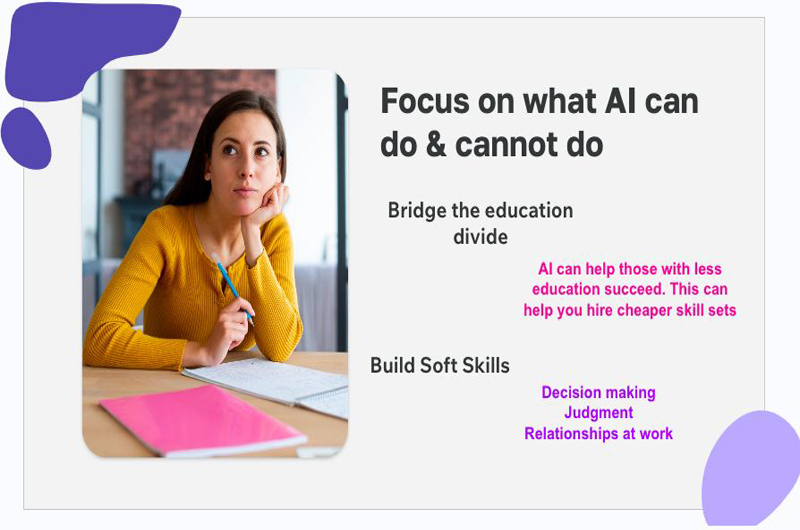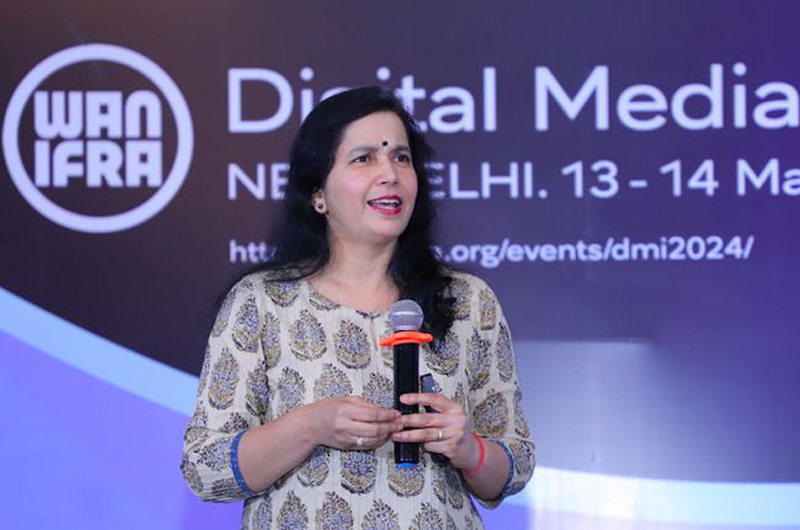If you’re a news publisher and wondering about getting started with AI, the good news is that many people on your staff are likely already using it in some form and that adoption will only continue, says Purva Misra of the India Today Group. Brian Veseling has the details of what else Misra had to say to participants at the Digital Media India Conference in New Delhi a while ago
“This transformation is happening whether or not you are fostering collaboration in your organisations, whether you are formalising it or not,” Purva Misra, chief human resource of the India Today Group told participants at WAN-IFRA’s Digital Media India Conference in New Delhi. Simply put, “No force on earth can stop an idea whose time has come,” she said quoting Victor Hugo. And the time for news publishers to get moving is really right now.
Through its four 24/7 national television channels, 18 digital platforms, and nine magazines, India Today Group reaches a monthly audience of 500 million, and are actively looking at where AI can help them. However, Misra also cautioned publishers to take care of how they start using AI and be realistic about their expectations. “AI is not a solution for everything. You’re going to have to be a little careful. I would say be careful and navigate the hype,” Misra said.
Train your high performers first
Misra’s advice is to begin training your high performers “because high performers ask the right questions.” When working with Generative AI, “it’s all about asking the right questions,” she noted. “Any generative AI cannot do things on its own, so imagine it’s like your friend who doesn’t know the company. You’re taking it around. You’re orienting it,” she said. “When you are prompting queries, if you want the best results, you are painting a picture that is very descriptive. … You do not need anything else, other than good language,” she emphasised.
Use your own information to train tools
Publishers should also focus their efforts on the kinds of things that AI is capable of handling well. “My learnings, and also the learnings from another very large, professional services firm, is to look at processes and tasks first. Don’t look at strategy, or any kind of very creative output where you need human intervention,” Misra said. Likewise, they are using their own existing archives to train their AI tools rather than relying on publicly available information.
“We have knowledge, data, pictures, videos and texts from over 50 years. And we started to mine that very carefully,” Misra said. “Now, when our AI tools crawl on that, we are able to get some very good information. We don’t want to use public information because that often gives us poor news. Or it gives us information that is not correct, and our journalists have to go through that very carefully.”

Four key ingredients for success
In addition, Misra pointed out four supporting initiatives that they are using, which she said have proven to be very helpful.
1. Avoid the job-cut mindset. When their first AI-anchor appeared, it created a sense of fear that people were going to lose their jobs. “The moment you create this threat in your company, people are going to be resistant to this technology. Your communication within your company has to be “This is going to benefit you. This is going to aid you,” she said. For example, in a late night situation, maybe the real anchor is not available, “but I have an AI substitute looking exactly like you who can do that job for you, so, it’s actually making you more effective,” she said. “The job-cut mindset is something I would really emphasise should go away. Job cuts may happen in the future, we don’t know, but that’s not the way you should approach this technology.”
2. Think of generative AI as your friend or assistant. “Make GPT your friend,” Misra said. “When you do that, you will get better results from it. If you don’t do that, it’s not going to grow up. So the more experimentation you do making this technology work for you, it’s going to give that much more back to you.”
3. Reward experiments. “And by this, I mean reward failure,” she said. “Without rewarding failure, you are not going to have success. Yes, success is important, but every time you work towards success – even if it means that you will fail in those attempts – it means you will have got ahead. That is the culture and mindset that we have been creating so we have innumerable teams within our company who are working on AI. Some succeed and some do not. And that’s fine.
4. Incentivise adoption. “We do that through small stories, we do that through small recognition, but we do that throughout. So, we do feel encouraged it is a good thing to use. ‘My company wants me to use this,’ ” Misra said.
(By special arrangement with WAN-IFRA. The writer is senior editor, WAN-IFRA.)



 from Webdoux
from Webdoux